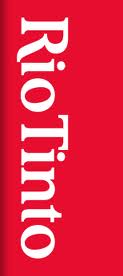 Rio Tinto has published its latest Taxes paid report, detailing the US$7.1 billion in taxes paid by the company around the world in 2014.
Rio Tinto has published its latest Taxes paid report, detailing the US$7.1 billion in taxes paid by the company around the world in 2014.
Rio Tinto is a global leader in providing detailed information about the taxes paid in the jurisdictions in which it operates globally and has produced an annual Taxes paid report for the past five years.
The voluntary report shows that Rio Tinto continues to make a significant contribution to public finances around the world and details all payments over US$1 million made to governments in the countries where Rio Tinto operates.
The majority of Rio Tinto’s taxes and royalties in 2014 were paid in Australia (US$5.6b), Canada (US$432m), Chile (US$262m), United States (US$211m), Mongolia (US$185m), South Africa (US$110m), France (US$106m), Guinea (US$67m), Singapore (US$44m) and UK (US$29m).
The report shows last year’s global effective tax rate was 43 per cent. Between 2010 and 2014, the company paid an average effective rate of about 42.5 per cent.
Rio Tinto chief financial officer Chris Lynch said “Rio Tinto continues to be a major contributor to the economies of its host nations. Through our tax and royalty contribution, investments, employment, local purchasing and contracting, we are a major generator of wealth and economic activity. We are very proud of this record.
“The Taxes paid report is important evidence of our commitment to taxation transparency. We were a founding member of the Extractive Industries Transparency Initiative and strongly advocate the need to appropriately disclose payments to governments around the world.
“2014 has been a year of significant change in the international tax landscape, with a particular focus on efforts to eliminate Base Erosion and Profit Shifting (BEPS). Rio Tinto agrees with the aims of these efforts. Governments must also be mindful not to inadvertently damage the investment environment when implementing BEPS proposals.
“To tackle BEPS issues effectively, we must adopt a coherent global approach and improve cross-border cooperation rather than take unilateral action that adds to compliance costs and dampens trade and investment.”
See the full report – www.riotinto.com/taxespaidin2014
